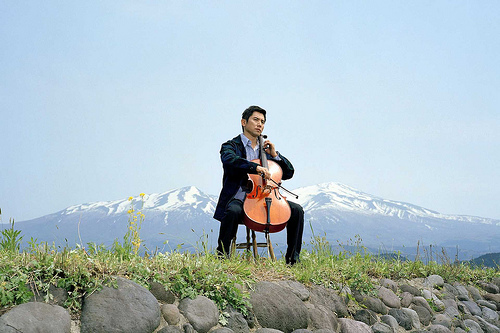Directed by Yôjiro Takita, Okuribito is based on the novel Nôkanfû Nikki (納棺夫日記, lit. Diary of an undertaker) by Shinmon Aoki [ja] and tells the story of a young cellist who suddenly finds himself without a job and reluctantly accepts a position as an undertaker in his hometown, a small town in Yamagata Prefecture.
More a film about the meaning of life and human values than about death, it shows to the viewer both the Japanese customs in ceremonials held before and at the time of a person's funeral and also the concept of death as seen from the Buddhist viewpoint as merely a transition instead of an ending.
Takaya in the blog Cinema Novo, explains the philosophy behind the movie.
人間誰でも望もうが望むまいが、生まれる時と死ぬ時は人様が手を貸してくれる。
生まれる時は助産の手助けを受け、死ぬ時は納棺師によって身体を清められ、あの世に旅立つ。
When they are born they need the help of a nurse.
When they die, they depart from this world after the undertaker has purified their body.
昨年度のキネマ旬報ベスト1に選ばれた『おくりびと』を観てきた。
『病院へ行こう』などライトコメディの中に社会の矛盾を描く事を得意とした滝田洋二郎監督はここで人生の見送り人、納棺師の仕事をつぶさに描きあげていた。
This time director Yôjiro Takita, who, in light comedy movies like Byôin he ikô [病院へ行こう, Let's Go to the Hospital (1990)], greatly portrayed the paradoxes of society, has here made a close up on the job of the undertaker who is present to supervise a person's funeral.
[…]
映画の中、「人生最後の買い物は他人が決めるのよね」とランク分けされた棺桶の前で語られるように、一番肝心なはずの生まれる時と死ぬ時は我が身を人様にゆだねるのが、この世の習いであり、どんな死に方をしてもそれは変えようがない。
[…]
死とは何なのか、生き物の死がなければ、人は喰うに困るのに、死を忌み嫌う。
斎場の火葬場の職員であるお爺さんが「死は門だと思う」と語る時、人生の見送り人、納棺師の仕事の意味が掴めてくる。
When [in another scene of the movie] the old man in charge of the crematorium at the funeral hall says “Death is a gate”, the real meaning of the undertaker’s role is shown.
「お疲れ様でした。いってらっしゃい。」

A scene from the movie. By id: sinemabed.
Okuribito will be on the American screens in late May and though it won an Oscar, as the blogger Guroneko says quoting a Mainichi Shinbun article,
whether “Departures” will commercially be successful in the US is another matter.
Nonetheless it is worthy of note that, in Japan, it made some people reflect on the meaning of life as in the case of Suiren, who describes her feelings about the movie immediately after watching it.
Let me write about Okuribito first, because I was deeply moved by it.
I laughed a lot but cried much more than I laughed. […] What moved me so much, I wonder..?Some people might live their lives successfully. Others might live feeling lonely or with depression. Some life might be exciting. Others might be just ordinary. Whatever, every life should be blessed.
I felt, in this movie, that one's life is treated so tenderly, so warmly, and with respect.
Despite being based on a novel, which is usually considered better than its cinematographic counterpart, the movie has been appreciated also by those who read the original story, like the blogger Zero-agency.
とかく本と映像を比較すると大概が映像の方が見劣りするが、これに関してはそれはありません。死者を送り出す納棺師の仕事を通じて見えてくるこの国の独特の文化を知り、また仕事に貴賎はないというが、現実の人間心理も上手く表現しているのも共感できる。本木雅弘の快演、余貴美子、山崎努の熱くて抑えた演技もこの映画を効果的にしている。
Besides the excellent acting of Masahiro Motoki and Kimiko Yo, the passionate performance of Tsutomu Yamazaki makes this movie even more effective.
Besides, as the job blogger You points out, the movie highlights another important question common to many so called ‘developed’ countries, the difference between those professions considered desirable and those considered less so or even shameful.
『式』とはどんなものか、そして必要なものなんだなって感じさせる作品なのでは、と。
ただ形式的にやるわけではなくしっかり向き合い血と心を通わせる。これが大事なんだなと。
それと死を扱う仕事が底辺の仕事と言う認識がある日本人には甚だ疑問が残るな、と。
以前友人がそう言った職に就いたときに『仕事がなくなって最後にやる仕事だろ』と他の人に言われたときはショックだった。
命を最後まで見守る医者が立派で、それを見送る人が底辺ってのはおかしな話。充分誇りを持ってやる仕事であろう。と俺は少なくとも思う。
They are not merely formal acts but have a deeper meaning and I believe that this is a main point made in the film.
When one friend of mine started to work as an undertaker, I remember I was shocked when I heard a mutual friend say “that's a job to do only if you don`t have any another choice!”
A doctor who looks after a person`s life until they die is praiseworthy while the job of someone who attends to their last rites is considered degraded which is weird. What I believe instead is that it's a job which should be done with pride.








6 comments
I’m looking forward to seeing this film. I couldn’t have seen in Tokyo anyway, since it wouldn’t have had subtitles :P
The movie was beautiful. Especially the score by Hisaishi Joe.
A breathtakingly beautiful film and a masterful piece of storytelling, subtle in tone yet full of surprises. I especially loved the images and textures of the town and the countryside and ordinary-yet-remarkable interior spaces. I understand some of the sets have been recreated in a building in Yamagata Prefecture and opened to the public – http://www.asahi.com/english/Herald-asahi/TKY200904140064.html
This was an amazing movie — I just caught it by chance on the plane a few weeks ago and was blown away! Strongly recommended.
It really was just beautiful! The story (in the film at least) is pretty darn simple, but it sure left an impact on me. Just listening to the soundtrack tune (http://www.youtube.com/watch?v=yacFUjAzuZQ) I remember exactly how I felt watching it, and subsequently doing some good thinking afterwards, really great.
I really,really want to see this Movie,but it’s unavalible where i live :(
Anyone Know where to watch it online!?Plezz e-mail me @: Maria080@live.com